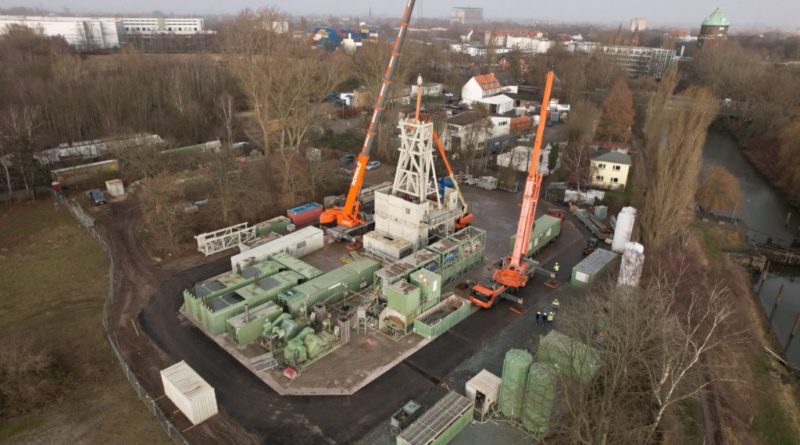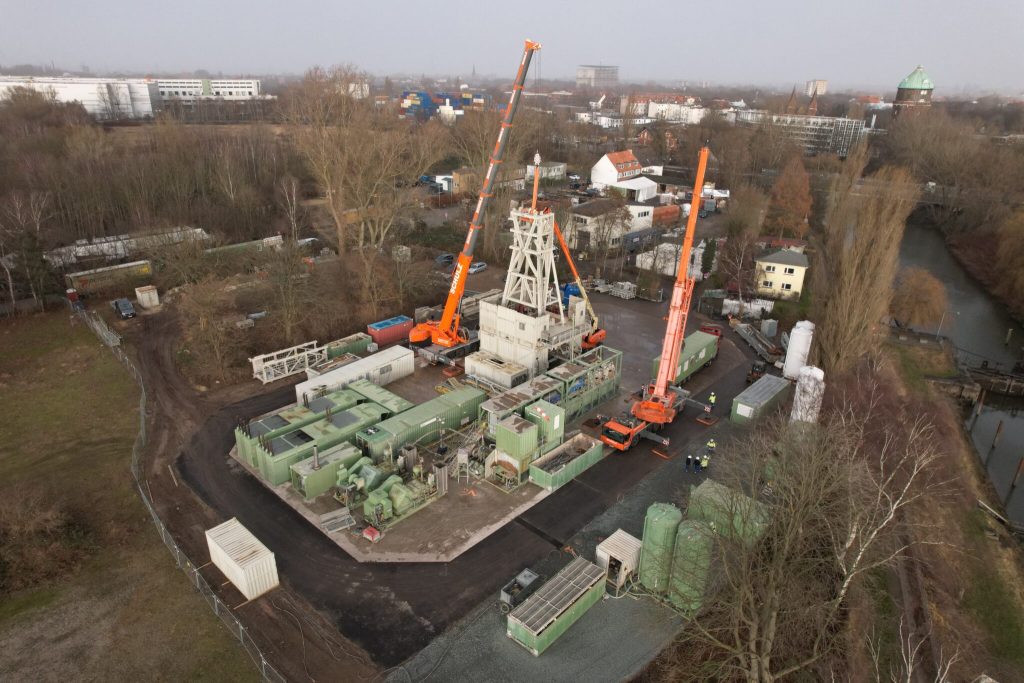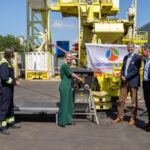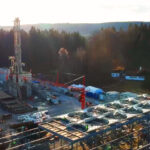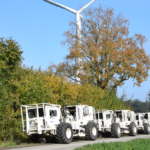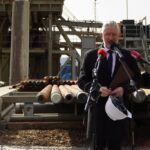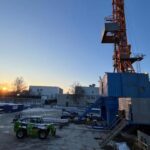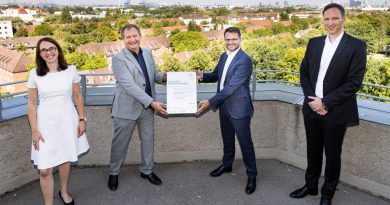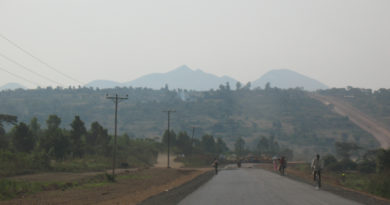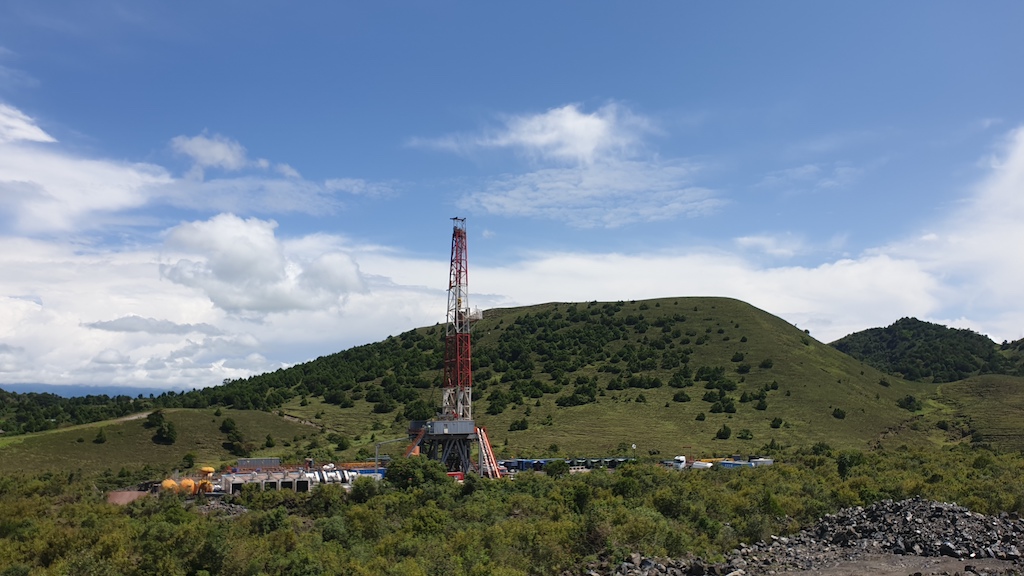City of Hamburg, Germany starts drilling on geothermal project
Energy Disrupter
Drilling has started for a planned pilot project to bring geothermal heating to 5,000 households in the city of Hamburg, Germany.
In Wilhelmsburg, part of the city of Hamburg in Germany, drilling for geothermal energy began today, as reported by the utility Hamburger Energiewerke. We previously reported on both funding by the federal government of Germany and the project itself.
Hamburg’s State Councilor for the Environment, Climate, Energy and Agriculture, Michael Pollmann, together with the managing directors of Hamburger Energiewerke, Michael Prinz and Ingo Hannemann from Hamburg Wasser, gave the starting signal. The drilling work is the first step towards the construction of a geothermal plant at the site, which will be implemented as part of the energy transition project IW3 by 2024.
If the boreholes are successfully completed, the geothermal system will in future pump geothermal energy in the form of hot thermal water from a depth of 3,500 meters to the surface. The energy is extracted from the water via heat exchangers and fed into the decentralized local heating network in Wilhelmsburg. The cooled water is then fed back into the thermal water-bearing layer underground. Two wells are planned for this: a production well to extract the hot thermal water and an injection well to return it underground. Drilling is expected to be completed in August. With an output of 10 megawatts, around 5,000 households in Wilhelmsburg could be supplied with green heat and at the same time around 7,000 t of CO 2 could be saved each year. Find further details via the project website here.
Michael Pollmann, State Councilor for the Environment, Climate, Energy and Agriculture: “There is an energetic treasure slumbering deep in the earth beneath Hamburg. We now want to start recovering this. Deep geothermal energy, for which we are giving the go-ahead today in Hamburg, offers considerable potential for decarbonising the heat supply. We are showing once again how Hamburg is implementing the phase-out of coal, how we are replacing the hard coal in Wedel with a large number of clean sources and thus also advancing new technologies. With deep drilling there is always a residual risk in terms of discovery, but we are confident that the project will be successful, because all the signs indicate that geothermal energy can and will make an important contribution to the heat transition in Hamburg.”
Michael Prinz, Managing Director of Hamburger Energiewerke GmbH: “We have been working towards the start of drilling for many years and I am delighted that we have now completed this important milestone. Here we deliver a pioneering concept for the decarbonization of the heat supply. The aim of our project is to initially contribute to an environmentally friendly and sustainable heat supply in Wilhelmsburg and also to serve as a blueprint that can also be implemented by other cities and communities in northern Germany for their own heat transition.
Ingo Hannemann, spokesman for the management of Hamburg Wasser: “I am very pleased to see how the joint project of Hamburger Energiewerke and Hamburg Wasser is becoming a reality. A lot of expertise and heart and soul went into it from both sides in order to implement one of the most important supply projects in the city, in which the focus is clearly on climate protection. We use our decades of experience in water, energy and hydrogeology to work with other urban stakeholders on innovations that combine security of supply and environmental protection. We see that as our mission for the city of Hamburg and its people.”
The system is part of the real laboratory IW3 – Integrated Heat Transition Wilhelmsburg, which aims to supply Wilhelmsburg residential areas with heat that is almost CO2-free: In addition to existing heat generators such as solar thermal energy, the use of geothermal energy forms the basis of the project. Through the additional integration of cross-sector technologies such as heat pumps, power-to-heat systems and the use of self-generated renewable electricity, a CO2-neutral supply possible. In addition, the construction of a seasonal aquifer storage is planned in order to be able to use excess heat from the summer months in winter. Different energy requirements can thus be efficiently combined with different energy availability. A digital heat marketplace bundles all local energy producers and consumers and enables buildings to be supplied with electricity in a cost-efficient and climate-friendly manner. The investment costs for the IW3 project amount to EUR 70 million.
As a “real laboratory of the energy transition”, the Federal Ministry for Economic Affairs and Climate Protection (BMWK) is also funding the project with a total of around EUR 22.5 million. The living laboratories are part of the 7th energy research program with which the federal government supports research and development in the field of future-oriented energy technologies. They test innovative technologies and their interaction on an industrial scale and under real conditions. This can refer to a district or to an entire district, as envisaged in the IW3 project. The empirical values ??collected in the real laboratories are used to advance the conversion of the energy system in Germany.
In addition to Hamburger Energiewerke as consortium leaders, Hamburg Energie Geothermie GmbH (HEGeo), Consulaqua mbH, HIR Hamburg Institute Research gGmbH, the Hamburg University of Applied Sciences (HAW) and Christian-Albrechts-University (CAU) are also involved in the Hamburg project Kiel involved.
Source: Hamburger Energiewerke

